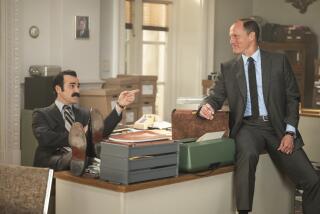You just can’t get good help these days
- Share via
Television has a long and rarely illustrious history of series in which a resourceful, lippy housekeeper, nanny, butler or maid is all that’s keeping a family of well-to-do incompetents from collapsing into a pathetic mess. From “Beulah” to “Benson” to “Mr. Belvedere,” servants have known best. But if their manner is pushy and to some degree acerbic -- think of Nell Carter’s Nell Harper in “Gimme a Break” or Fran Drescher’s Fran Fine in “The Nanny” -- their affection for and loyalty to their employers is never in doubt.
Boy, does “The Help” ever take a broom to that tradition. In the new comedy scheduled to premiere at 9:30 p.m. Friday on the WB network, creator-executive producer Ron Leavitt approaches TV’s traditional depiction of domestic service and employer-employee relations much the same way he did the medium’s fondness for familial bliss in “Married ... With Children” and “Unhappily Ever After.” Which is to say, about as gently and sentimentally as Drano.
The wealthy Ridgeways employ two nannies, one elderly and narcoleptic, the other a “Baywatch”-style babe. The gardener lets it slip that he digs up and disposes of healthy plants and shrubs so he can put in replacements supplied at padded prices by his amigos.
And even by the standards of Marla Gibbs’ fearlessly insolent Florence in “The Jeffersons” or Shelley Morrison’s exploited, resentful Rosario in “Will & Grace,” there are staff who can only be described as vengeful. The cook spits in the ice trays as she fills them. The Ridgeways are the fools we’ve come to expect from sitcoms that revolve around domestic help, but more arrogant, entitled and insensitive. They’re the kind of folks who threaten to fire the entire staff if a missing wad of cash doesn’t show up, then don’t even bother to tell the workers when the money turns up.
“You see a show like ‘Benson,’ ” said Leavitt. “Everybody really cares about the boss. He’s a bumbler or something and needed the help to get by.”
He said shows of that ilk “always seemed too sweet. Even as a kid, I just didn’t get it. It was like, oh, the maid solves the problem. It’s like they’re so noble. And they are in a way, just from doing that job. But they never had evil intent. They never seemed to realize that the people they were serving were actually [not nice people].”
But Leavitt said he didn’t set out to do a “Married ... With Children”-style satirical reversal. While the end product may be similar in attitude to his earlier smash, the idea comes from his personal discomfort with dealing with household help.
Just from discussing the topic with colleagues over the years, Leavitt said, he knows there’s “a sort of dichotomy. Some people -- and I may put this in the show some place -- leave the maids these long notes with underlined things, things in red, that they should or shouldn’t do -- ‘You’re fired if you do this.’ There’s that, and there’s people who clean the house before the maids come because they’re ashamed. Everybody has a different view of it.”
Leavitt said “The Help” reflected his thinking about “how evil we must seem to them when we think we’re so nice and everything. I just kind of think that maybe they hate us.”
More to Read
The complete guide to home viewing
Get Screen Gab for everything about the TV shows and streaming movies everyone’s talking about.
You may occasionally receive promotional content from the Los Angeles Times.






